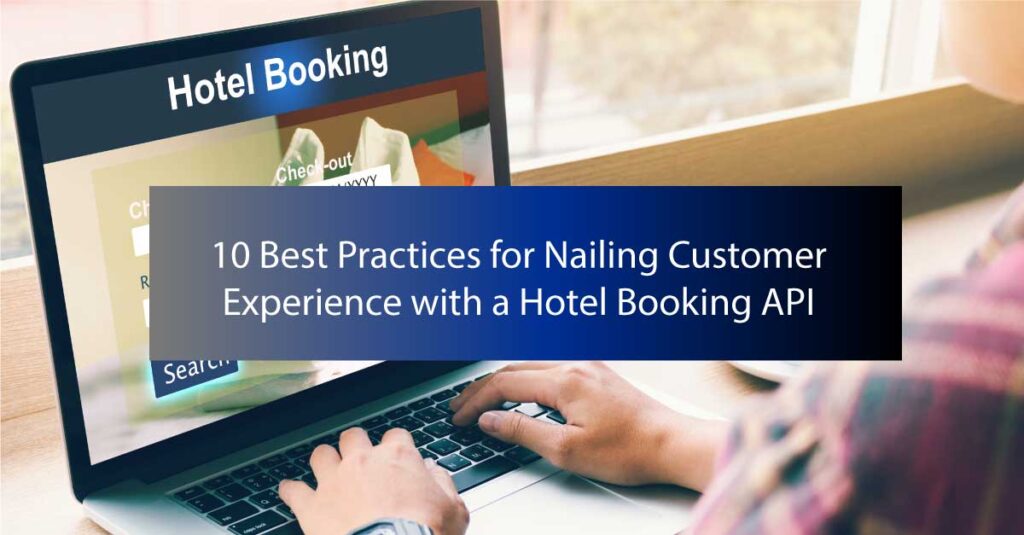Picture this: a traveler excitedly plans their dream vacation, finds the perfect hotel, clicks “Book Now,” and… the page loads forever, sees the same hotel listed twice, or worse, the price suddenly changes. Frustrating, right? Moments like these can make or break customer trust in your platform.
For online travel businesses, delivering a seamless customer experience isn’t just a nice-to-have; it’s a must. Travelers today expect speed, accuracy, and convenience at every click. A well-designed hotel booking API can work wonders, acting as the backbone of an exceptional booking journey.
In this blog, we’ll explore ten practical and proven best practices to ensure your hotel booking API meets and exceeds customer expectations. From implementing hotel mapping solutions to optimizing response times, these strategies will set you up for success in creating a delightful booking experience.
But first, let’s understand the hotel booking API. To put it simply, a Hotel Booking API is a software interface that allows travel platforms, websites, and apps to connect with hotel databases and retrieve information such as room availability, pricing, and property details in real time. It bridges between a booking platform and various hotel suppliers, enabling seamless communication and transactions.
Now that the concept of a hotel booking API is clear let’s dive into the practices!Also Read: Choosing the Right Hotel Booking API: A Step-By-Step Guide1. Choose an API with Wide Inventory Coverage
Partner with API providers known for aggregating a large pool of global properties and frequent inventory updates.
The more options you offer, the better the customer experience. A Hotel Booking API with broad inventory coverage integrates data from multiple suppliers, including hotels, wholesalers, and OTAs (Online Travel Agencies). This helps ensure that your platform has options ranging from luxury resorts to budget stays, allowing customers to choose accommodations that match their needs. A diverse inventory widens their choices and increases the chances of bookings, boosting your revenue.
2. Prioritize Real-Time Availability and Pricing Updates
Opt for APIs that frequently sync with hotel systems or use webhooks for instant updates.
Nothing frustrates customers more than booking a room only to find out it’s unavailable or the price has changed. They expect accurate information when booking accommodation. APIs with real-time updates ensure room availability and rates are always current, minimizing discrepancies. This helps build trust and enhances the booking experience, ensuring customers get accurate availability and pricing information.
3. Ensure Easy Integration
Choose an API provider with 24/7 developer support and a sandbox environment for testing integrations.
An API that’s difficult to integrate can delay your platform’s go-live timeline and increase technical issues.
Choosing a developer-friendly API with clear documentation, sample codes, and SDKs ensures smooth implementation. Easy integration ensures a seamless connection between your platform and the API, providing a hassle-free experience for you and your customers.
4. Optimize API Response Time
Monitor your API’s performance regularly and use caching for repetitive requests to reduce server load.
A slow API can result in abandoned bookings and reduced customer satisfaction. Focus on APIs known for their speed and optimize backend calls to reduce latency. Quick response times ensure a smoother user experience, smooth navigation, and instant updates during the booking process.
5. Implement a Hotel Mapping Solution
Duplicate listings, mismatched details, or missing properties can confuse users. Implementing a hotel mapping solution helps organize and standardize hotel data across various suppliers, ensuring accuracy and consistency.
Here’s how: When your booking system aggregates inventory from various suppliers, there’s often a risk of duplicate listings, conflicting property details, or incomplete information. This can confuse users trying to book an accommodation, often leading to frustration and lost bookings. A hotel mapping solution, such as Vervotech Hotel Mappping, eliminates these issues by standardizing data for each property.
For instance, if one supplier lists “Hilton Downtown” and another lists it as “Downtown Hilton,” the mapping solution recognizes they’re the same property and consolidates the details into a single listing.
Vervotech’s Hotel Mapping Solution helps online travel businesses eliminate errors, simplify navigation, and standardize hotel content on the platform.
Also Read: A Beginner’s Guide to Hotel Mapping Solutions
6. Offer Personalization Options
Use APIs with advanced filtering options and AI-driven recommendation engines to deliver personalized experiences.
Believe it or not, personalization helps create a more tailored and engaging booking experience. Customers appreciate personalized recommendations based on preferences like favorite destinations or budget ranges. This is why you should choose APIs that allow filtering by preferences like destination, budget, and amenities to enable your platform to recommend options aligned with user needs. This will not only enhance the user experience but also help increase conversion rates by aligning options with individual needs.
7. Focus on Mobile Compatibility
Test the API across multiple devices and browsers to ensure consistent performance.
With many bookings made on mobile devices, ensuring mobile compatibility is highly important. Go for APIs optimized for mobile performance, offering features like responsive design, touch-friendly interfaces, and fast loading times. This helps ensure a smooth experience for customers booking on the go.
8. Provide Clear Cancellation and Refund Policies
Ensure your API fetches detailed policy information for each listing and displays it prominently during the booking process.
Transparency in cancellation and refund policies builds trust and reduces disputes. This is why ensuring your API provides clear and detailed information on cancellation and refund policies for every booking is necessary. Displaying this upfront reassures customers, reduces disputes, and makes your platform more user-friendly. Customers value platforms that clearly display rules upfront and make the process easy to understand.
9. Enhance Multilingual and Multi-Currency Support
Implement APIs with localization capabilities, including language preferences and region-specific payment options.
Catering to a global audience means accommodating different languages and currencies. APIs with multilingual support and automatic currency conversions help international customers feel at ease. This inclusivity expands your reach, making your platform more accessible and appealing to diverse users.
10. Regularly Test and Update Your API
Schedule routine API tests and updates to align with supplier system changes and user feedback.
APIs are dynamic and require regular updates to stay reliable and secure. An outdated or buggy API can disrupt the customer journey. Regular testing and updating can help you ensure optimal performance, smooth functionality, compatibility with your platform’s evolving needs, and compliance with industry standards. This helps identify and resolve issues before they impact user experience, keeping your platform reliable and competitive.
So, that was the list of the ten best practices to nail customer experience with a Hotel Booking API.Creating an exceptional customer experience can set your platform apart.
A robust and well-optimized hotel booking API is the key to achieving this. Following the practices listed above, such as implementing a hotel mapping solution, ensuring real-time updates, and optimizing API response times, can help you build a booking platform that’s fast, reliable, and user-friendly. Remember, every seamless booking experience strengthens customer trust and loyalty, turning first-time users into repeat customers.
Start implementing these strategies today, and watch your platform become a preferred choice for travelers worldwide. Take the next step toward optimizing your Online Travel Business
Start a free trial Vervotech is a leading Hotel Mapping and Room Mapping API that leverages the power of AI and ML to quickly and accurately identify each property listing through the verification of multiple parameters. With One of the industry’s best coverage of 98% and an accuracy of 99.999%, Vervotech is quickly becoming the mapping software of choice for all leading global companies operating in the travel and hospitality industry. To learn more about Vervotech and the ways it can enhance your business in the long run contact us: sales@vervotech.com








